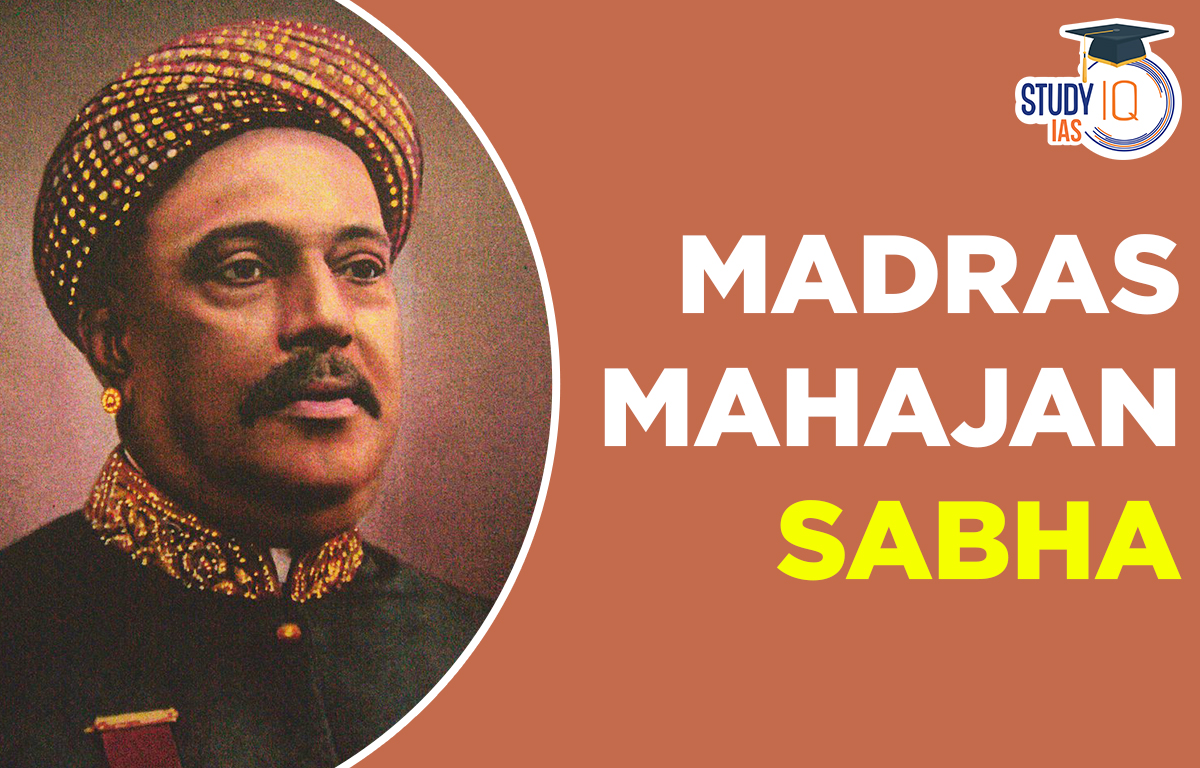Table of Contents
Madras Mahajana Sabha
Indian nationalist group Madras Mahajana Sabha was headquartered in the Madras Presidency. Along with the Poona Sarvajanik Sabha, the Bombay Presidency Association, and the Indian Association, it is considered as a precursor to the Indian National Congress. The Madras Mahajana Sabha was started in May 1884 by M. Veeraraghavachariar, G. Subramania Iyer, and P. Ananda Charlu. We will learn more about the goals and characteristics of the Madras Mahajan Sabha in this piece, which will be beneficial for UPSC exam preparation.
Read about: Mahajanapadas
Madras Mahajan Sabha History
The Madras Native Association was the first group to fight for Indian liberties in the Madras Presidency, having been established in 1852 by publicist Gazulu Lakshminarasu Chetty. This group did not last very long; ultimately, it was dissolved. In May 1884, the Madras Mahajana Sabha was established by M. Veeraraghavachariar, G. Subramania Iyer, and P. Anandacharlu.
At a conference conducted at the Adyar Theosophical Society, the members of the sabha expressed their fervent support for the concept, which was later actualized by the formation of The Indian National Congress. The Madras Mahajana Sabha was viewed by South Indians as a unique organisation that paved the way for the liberation of India. For the benefit of our fellow citizens, the Sabha has fought for Indians’ fundamental rights since 1884, including national freedom and other widespread social problems. The Madras Mahajana Sabha marked its Diamond Jubilee on January 31, 1945.
Read More: Poona Sarvajanik Sabha
Madras Mahajan Sabha Objectives
To relieve and free India from the grip of British rule and to address Indian issues, members of the Mahajan Sabha felt the need to create an association at the All India level. Members regularly convened, discussed public problems in private, hosted town hall meetings, and voiced their opinions to the government.
Abolition of the Council of India in London, simultaneous civil service exams in England and India, tax reductions, and cuts to civil and military expenditures were among its demands. The 1885-founded Indian National Congress subsequently adopted a number of its demands.
Read More: Deccan Riots
Madras Mahajan Sabha Features
At first, The Sabha’s headquarters was situated inside The Hindu’s building at Ellis Road Junction on Mount Road. P. Rangaiah Naidu was chosen to lead the Sabha in 1885. Together with the Bombay Presidency Association and the Indian Association, the Sabha dispatched a delegation to London in September 1885. The first meeting of the Mahajana Sabha took place between December 29, 1884, and January 2, 1885. The Sabha initially adopted a cautious stance. However, it was regarded as having seditious aims and objectives.
Viceroy of India Lord Elgin declined to receive the welcome speech from the Madras Mahajana Sabha during a visit to Madras in December 1895. The nation’s founder, Mahatma Gandhi, spoke to the Mahajana Sabha on October 24, 1896. The Sabha organised the Salt Satyagraha campaign on April 22, 1930, in Madras’ George Town, Esplanade, High Court, and Beach neighbourhoods. British police violently attacked the Sabha members, who then sacrificed their lives for the sake of the country.
A three-member committee headed by Justice T.R. Ramachandra Iyer conducted thirty interviews and delivered its report to the government as the Sabha insisted on a legal inquiry into the injustice meted out to Satyagraha participants. Advocate Sri Govindasamy was killed when the British Police opened fire at the Bal Gangadhar Tilak Public Meeting at Pycrofts Road on April 27 in a similar assault.
Once more, it was the Madras Mahajana Sabha that acted decisively to form a committee to investigate the deaths of Sri Govindasamy and Diwan Bahdur. Sri R. N. Arogyasamy Mudaliar served as the chairman of the commission that exposed the truth to the world. Many Sabha members were detained for their involvement in the Quit India Campaign in 1942. The Madras Mahajana Sabha organised a number of shows, including the All India Khadi Exhibition and the Swadeshi Exhibition, to foster national pride in their citizens following the British government’s decision to outlaw the Congress Party.
At Raj Bhavan in Madras on December 31, 1969, members of the Sabha’s Executive Committee convened with Frontier Gandhi, aka Khan Abdul Ghaffar Khan. The Sabha offered free nighttime classes in Hindi. Officials from both the public and private sectors profited from this service.
Read More: Poligars Revolt
Madras Mahajan Sabha UPSC
The first part of the nineteenth century saw the emergence of political organisations. They were working on a local level as opposed to a pan-Indian level. They had general demands like improving Indian representation in government, enacting military and educational reforms, promoting the growth of contemporary industries in India, and so on. To calmly criticise governmental actions, the Madras Mahajan Sabha was established. The Sabha initially adopted a cautious stance. This piece contains all the information you need to know about Madras Mahajan Sabha for the UPSC Exam.


 Jallianwala Bagh Massacre, Date, History...
Jallianwala Bagh Massacre, Date, History...
 Important Lakes of India, State wise and...
Important Lakes of India, State wise and...
 Buddhism History, Origin, Sect, Councils...
Buddhism History, Origin, Sect, Councils...





















